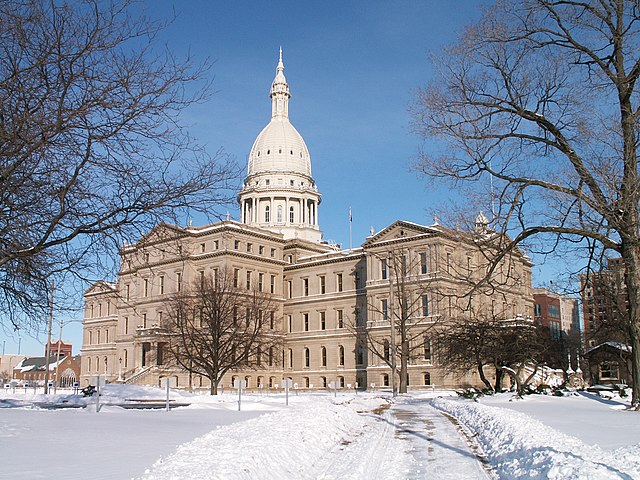The Michigan State Legislature will have 40 days to approve an initiated measure to repeal the Emergency Powers of Governor Act (EPGA), also known as Public Act 302 (PA 302) of 1945. The EPGA was designed to empower the governor to issue rules and regulations to bring emergencies under control and protect life and allow violations of these rules and regulations to be punished as misdemeanors. The initiated measure is an indirect initiative, meaning the legislature can approve the initiative, without the governor’s signature needed, or have the initiative go before voters at the election on November 8, 2022. Republicans control both chambers of the Michigan State Legislature, and simple majorities are needed in each chamber to pass the initiative.
In June 2020, about three months after Gov. Gretchen Whitmer (D) issued the first coronavirus-related disaster declaration, the campaign Unlock Michigan filed the proposal. On October 2, 2020, the campaign reported submitting 539,000 signatures. Also on October 2, the Michigan Supreme Court, in a 4-3 decision, struck down the EPGA as violating the state constitution. While the Supreme Court rendered the EPGA moot, Unlock Michigan continued to advocate for the law’s repeal to prevent the court from issuing a different opinion on the law in the future. On April 19, 2021, elections staff reported that, based on a random sample, a projected 460,358 signatures were valid. The minimum number of required signatures was 340,047.
On April 22, 2021, the Board of State Canvassers voted 2-2 on certifying the petition as sufficient. The divided vote meant that the motion failed. The Board’s two Republicans voted in favor, and the Board’s two Democrats voted in opposition. On June 11, 2021, the Michigan Supreme Court unanimously ruled that the Board “has a clear legal duty to certify the petition,” which the Board did on July 13, 2021.
Fred Wszolek, spokesperson for Unlock Michigan, responded to the initiative’s certification, saying, “We’re looking forward to the next and final step on this long road: passage by the Michigan House and Senate of our initiative to repeal this law so abused by Gov. Whitmer.” Mark Fisk, spokesperson for the opposition campaign Keep Michigan Safe, also responded, “Unlock Michigan’s brazen partisan power grab will further reduce our state’s ability to save lives during public health emergencies like the COVID-19 pandemic and handcuff future generations of leaders from acting decisively in times of crises.”
The campaign Unlock Michigan received $2.81 million through April 20, 2021. Donors included the nonprofits Michigan Citizens for Fiscal Responsibility ($1.78 million) and Michigan! My Michigan! ($450,000), as well as University of Michigan Regent Ron Weiser ($100,000). Opponents of the proposal organized Keep Michigan Safe, which received $843,180, including $750,000 from the nonprofit organization Road To Michigan’s Future.
On July 13, the Board of State Canvassers also approved language for Unlock Michigan’s second ballot initiative, allowing the campaign to begin a signature drive. After the Michigan Supreme Court struck down the EPGA, Gov. Whitmer and the Michigan Department of Health were able to continue emergency regulations under Public Health Code. Unlock Michigan’s new proposal would limit state and local epidemic emergency orders to 28 days unless the jurisdiction’s legislative body approves a resolution to continue the emergency order.
In May, Pennsylvania became the first state to vote on a governor’s emergency powers following coronavirus-related regulations. Voters approved two constitutional amendments allowing the legislature to extend or terminate the governor’s emergency declaration by a simple majority vote and limiting the governor’s emergency declaration to 21 days.
Additional reading:
Michigan Limits on Epidemic Emergency Orders Initiative (2022)


